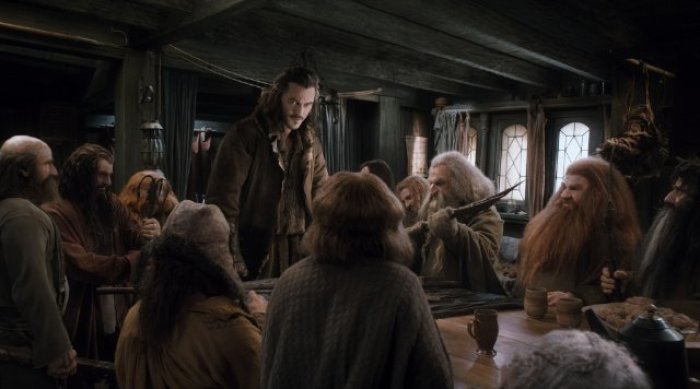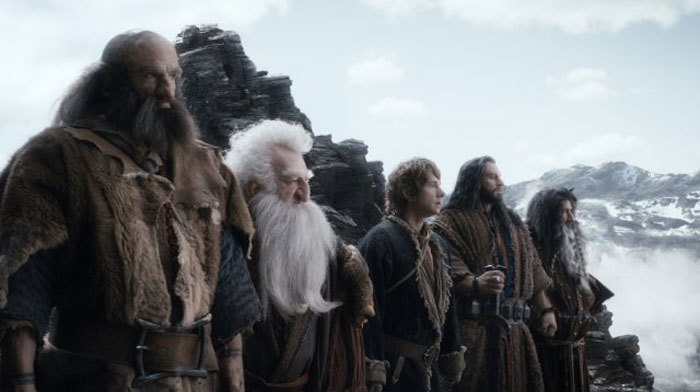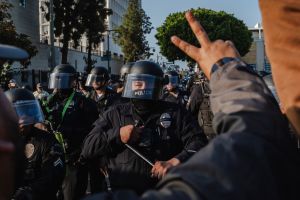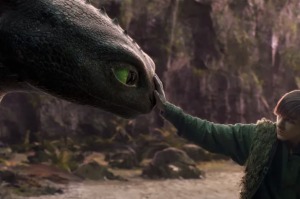'The Hobbit: Desolation of Smaug' 'Botched' Tolkien's Work? Christian Reviewers Give Mixed Reactions

While "The Hobbit: Desolation of Smaug" won at the box office and has generally high ratings among viewers, many Christian reviewers criticized it as a betrayal of J.R.R. Tolkien's original work. Even one of its staunch defenders said that a closing scene was unnecessary.
"Everybody keeps pretending that this is 'The Hobbit' movie, I just don't think it is," Diana Pavlac Glyer, English professor at Azusa Pacific University, told The Christian Post in an interview on Monday. Glyer said there is no problem with making a prequel to "The Lord of the Rings," but insisted that "the story of 'The Hobbit' is not the primary story that Peter Jackson wants to tell."
Jay Richards, distinguished fellow at the Institute for Faith, Work, and Economics, agreed. "Later in life, Tolkien looked back to try to enrich 'The Hobbit,' and that's what Peter Jackson is doing in a cinematic context," Richards argued. His forthcoming book with co-author Jonathan Witt, The Hobbit Party, engages Tolkien's political and economic ideas, as expressed in "The Hobbit."
"The Hobbit" is a tale about restoring the golden age of Erebor, Richards explained, which involved "a system of trade between elves and humans and the dwarves – benevolent, benign trade between three different species." Richards argued that Tolkien's Christian values have been "sown into the story itself," even in Peter Jackson's adaptation.
Richards praised both book and movie as "a pre-evangelistic opportunity for Christians – dignifying Christian themes in a way that reaches out to secular people." He also emphasized that the new films give Christians a chance to discuss these themes in the public square, to press for free trade in politics.
Glyer, whose book The Company They Keep: C. S. Lewis and J. R. R. Tolkien as Writers in Community explains the relationships behind the authors of Narnia and Middle Earth, drew a clear line between Jackson's films and Tolkien's children's book. "You're taking a story about a quest and turning it into a war epic."
Glyer argued that Tolkien would have rejected the excessive violence in the film, just as she finds it distasteful. "There are so many orcs in this film – I really got tired of watching them die," she exclaimed. She argued that the sections of Tolkien's story that this film covers featured almost no orcs, and that the carnage of orc death marred the film substantially.

It isn't funny for me to watch that over again – two orc heads at once – I was just flabbergasted at that," Glyer said. She then lamented the cultural state of America: "We are living in 'The Hunger Games,' in a culture where three hours of non-stop slaughter is summarized as 'I found the film entertaining.'"
Glyer even pointed to a perverse moral lesson in one scene where the head elf promises not to kill an orc if he tells the truth. "They promise to let him go if he gives them the information they want and then they decapitate him – what a moral choice that is!" she exclaimed.
Richards, however, saw the opposite moral lesson. "I have to confess, I never tire of seeing orcs impaled and beheaded, for some reason," he admitted. "They are a kind of incarnate demons," and seeing them die reminds viewers of the just wrath of God.
But even Richards criticized one of the final scenes. As the dragon Smaug flies around, attempting to roast Bilbo and his dwarf friends, the group melts a huge golden statue, and the dragon falls into the burning lava. Despite this powerful hit, Smaug emerges unharmed, and flies off to burn the city of men. "It's frankly obscure as to what they're doing," Richards said. "That part could have been cut on the editing floor and that would have improved the film."
Glyer agreed. "I'm not a purist who believes that a fantasy world has to obey Earth rules, but Jackson sets up rules and then breaks them," she argued. Impossible things, like molten gold not cooling quickly, or a dragon being able to rise from the metal-lava, kept her from accepting the film. "There's no credibility left by the end," she declared.
Some Christian reviewers declined to watch the film, saying Jackson has completely botched Tolkien's work. "I haven't watched The Milking of Smaug yet," explained Craig Detweiler, associate professor of Communication at Pepperdine University. "I didn't want to encourage Hollywood to stretch small stories into nine hour epics."
Alex Wainer, associate professor of Communication and Media Studies at Palm Beach Atlantic University, told CP that "after seeing part 1, and feeling like literary desecration had been wrought on Tolkien's children's story by inflating it with extra characters and overstuffing it with plot and characterization nowhere in that book, I decided not to see part two."




























